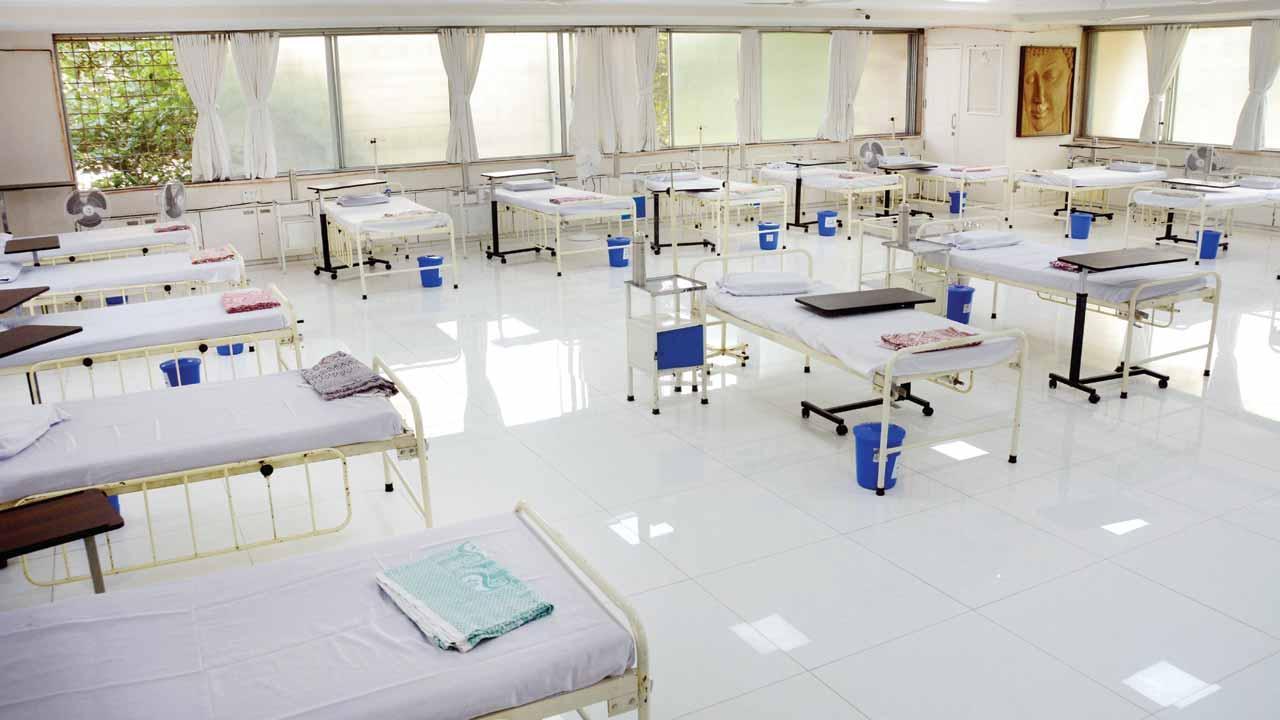Health minister says confirmed cases will be shifted to Covid-19 Care Centres (CCCs), and more of it will be set up in towns and villages

Pawandham Jain Temple in Kandivli has been converted into a Covid-19 Care Centre. File pic
Considering the fact that 18 districts of the state continue to record a high number of Covid-19 cases, the government has made institutional quarantine mandatory to control the transmission of the virus. Henceforth, home isolation will not be allowed. The suspected as well as confirmed cases will be shifted to Covid-19 Care Centres (CCCs) for treatment, and more of CCCs will be set up in towns and villages to accommodate patients.
ADVERTISEMENT
Antigen tests being conducted at the Lokmanya Tilak Terminus on Tuesday. Pic/Sayyed Sameer Abedi
Even after almost a two-month lockdown, 18 out of the 36 districts, including neighbouring Thane and Raigad, haven’t seen much reduction in the caseload, positivity and death rates, and increase in the recovery rate. The authorities found that people in home isolation violated Covid-19 appropriate behaviour, thus risking others. Another reason for the increased transmission is small-sized houses, which do not provide the scope of complete isolation. As a result, entire families have been infected.
Health minister Rajesh Tope, who attended a meeting of district officials, told the media on Tuesday that making institutional isolation mandatory was much-required. “We reviewed the situation in districts where the performance is not at par with the state’s average recovery rate (93 per cent), positivity rate (12 per cent) and death rate (8.5 per cent). These districts will create more CCCs, especially in villages. The gram panchayats have been allowed to use 25 per cent of the Finance Commission’s grant for creating 25-30 bed isolation facilities,” he said.
Largely unaffected in the first wave, rural parts of the state was greatly impacted in the second one. The ‘red districts’, Satara, Ratnagiri, Sindhudurg, Usmanabad, Beed, Raigad, Pune, Hingoli, Akola, Amravati, Kolhapur, Thane, Sangli, Gadchiroli, Wardha, Nashik, Ahmednagar and Latur, have been asked to follow the ‘only institutional isolation’ model. Of these, Ahmednagar has been following
the model.
Sources said protecting rural Maharashtra against Covid-19 was necessary ahead of the Kharip season, for which a large labour force is required. The first wave allowed farmers to work on fields during the last season, which helped the state boost its agricultural growth. But this monsoon is expected to be different. The hinterland is already fighting the second wave and a third one is expected to hit the state during the peak farming season.
“Rains will start soon, and so will the sowing of crops. Pre-monsoon preparations have been hit in many villages because of the virus. The farmers and labourers must be fit to work, or else, we will be facing hardships in the agriculture sector as well,” said a government officer.
Since testing has been an issue, Tope has asked the health department to focus on it. “By testing everyone we should not reduce the positivity rate. The high and low risk contacts of infected people should be tested. This is how we can reduce transmission,” he added. According to the minister, the Asha workers were trained in using rapid antigen and self-testing kits to expand the prevention measures.
Instructions have also been issued to conduct fire and electricity audits of all health facilities. The districts have been asked to organise a team of paediatricians and set up child wards to tackle the third wave.
 Subscribe today by clicking the link and stay updated with the latest news!" Click here!
Subscribe today by clicking the link and stay updated with the latest news!" Click here!






